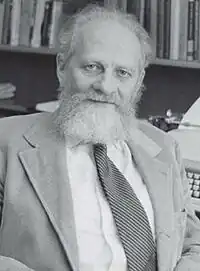Peter Blau
Peter Michael Blau est un sociologue américain d'origine autrichienne né le à Vienne et mort le à New York. Il a élaboré une théorie générale des organisations.

| Naissance | |
|---|---|
| Décès |
(à 84 ans) New York |
| Nationalité | |
| Formation |
Université Columbia (doctorat) (jusqu'en ) Elmhurst University (en) |
| Activités |
| A travaillé pour | |
|---|---|
| Membre de | |
| Distinctions |
Biographie
En 1939, Peter Blau émigre aux États-Unis et entreprend des études à l'Université Columbia où il est l'élève de Robert K. Merton. Il soutient sa thèse en 1952 et obtient un poste d'enseignant l'année suivante à l'Université de Chicago. En 1970, il retourne à l'Université Columbia où il est enseignant jusqu'en 1988.
Bibliographie
- P. Blau, The Dynamics of Bureaucracy, Chicago, University of Chicago Press, 1955.
- P. Blau, "A Theory of Social Integration", American Journal of Sociology, Vol. LXV, No. 6, p. 545, 1960.
- P. Blau, R. Scott, Formal organizations, San Francisco, Chandler, 1962.
- P, Blau, Exchange and Power in Social Life, New York, John Wiley and Sons, 1964.
- P, Blau, The American Occupational Structure, 1967.
- P. Blau, A Formal Theory of Differentiation in Organizations, 1970.
- P. Blau, Approaches to the Study of Social Structure, New York, The Free Press A Division of Macmillan Publishing Co., 1975.
- P. Blau, Inequality and Heterogeneity: a primitive theory of social structure, 1977.
- P, Blau, J. E. Schwartz, Crosscutting Social Circles: Testing a Macrostructural Theory of Intergroup Relations, 1984.
Citations
Définition du Pouvoir : C'est « la capacité qu'a un individu ou un groupe, d'obtenir que quelqu'un fasse ou pense quelque chose qu'il n'aurait ni fait ni pensé autrement ». Exchange and Power in Social Life, New York, Joshn Wiley & Sons, 1964, 352 p.; cité dans Le changement planifié, Pierre Collerette, Gilles Delisle, Montréal, Les Éditions agence d'arc, 1982, p. 158 (213 p.)
Notes et références
Voir aussi
Articles connexes
- Sociologie des organisations
- Sociologie structurelle
- Microsociologie et macrosociologie
- Bureaucratie
Liens externes
- Notices dans des dictionnaires ou encyclopédies généralistes :